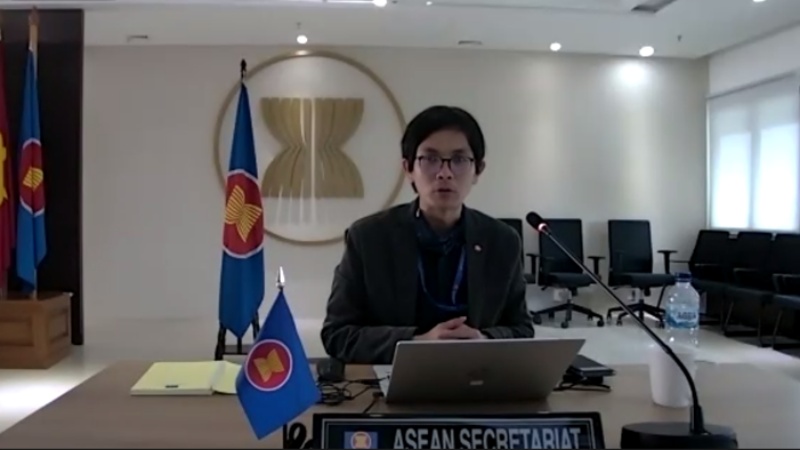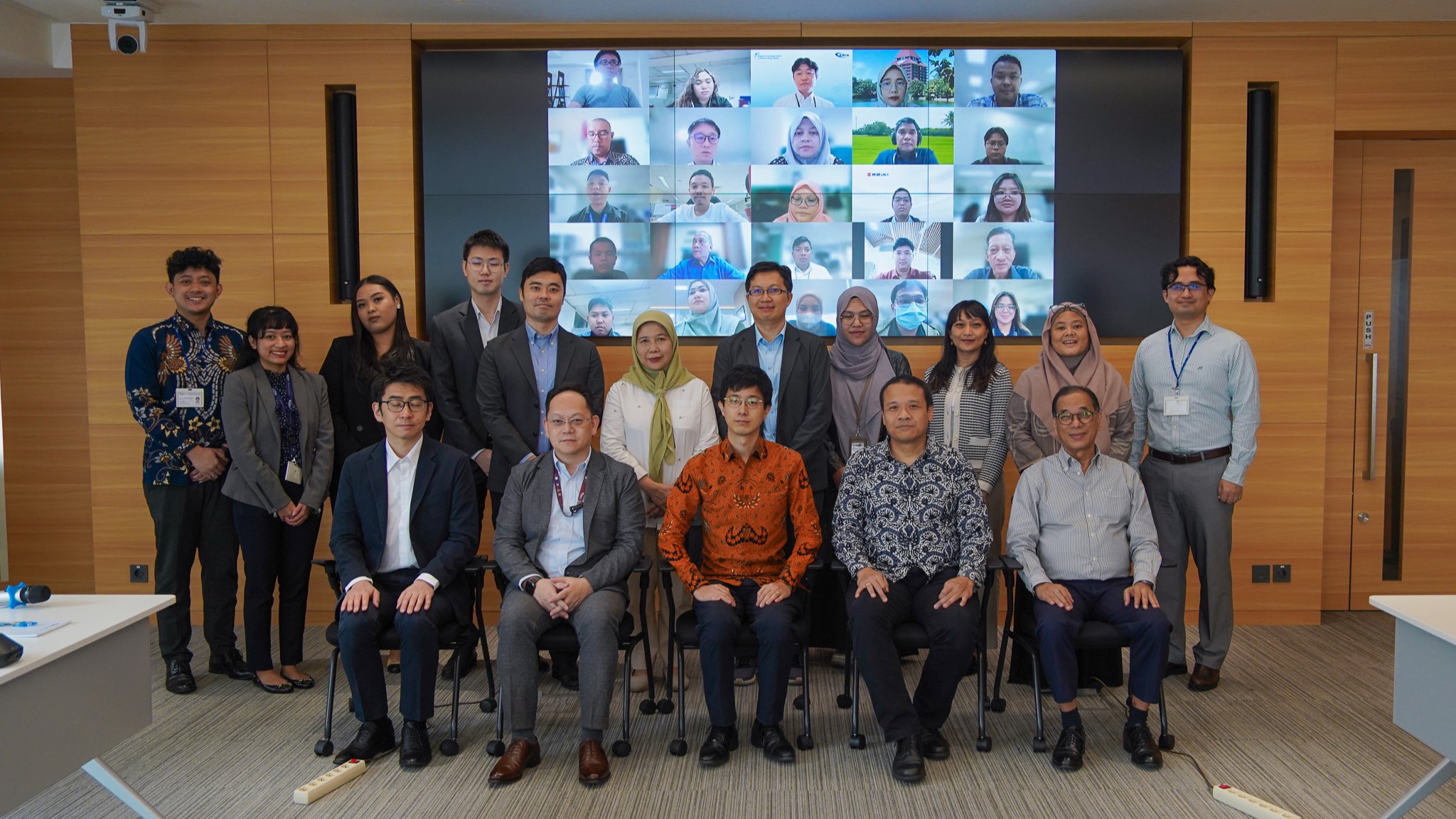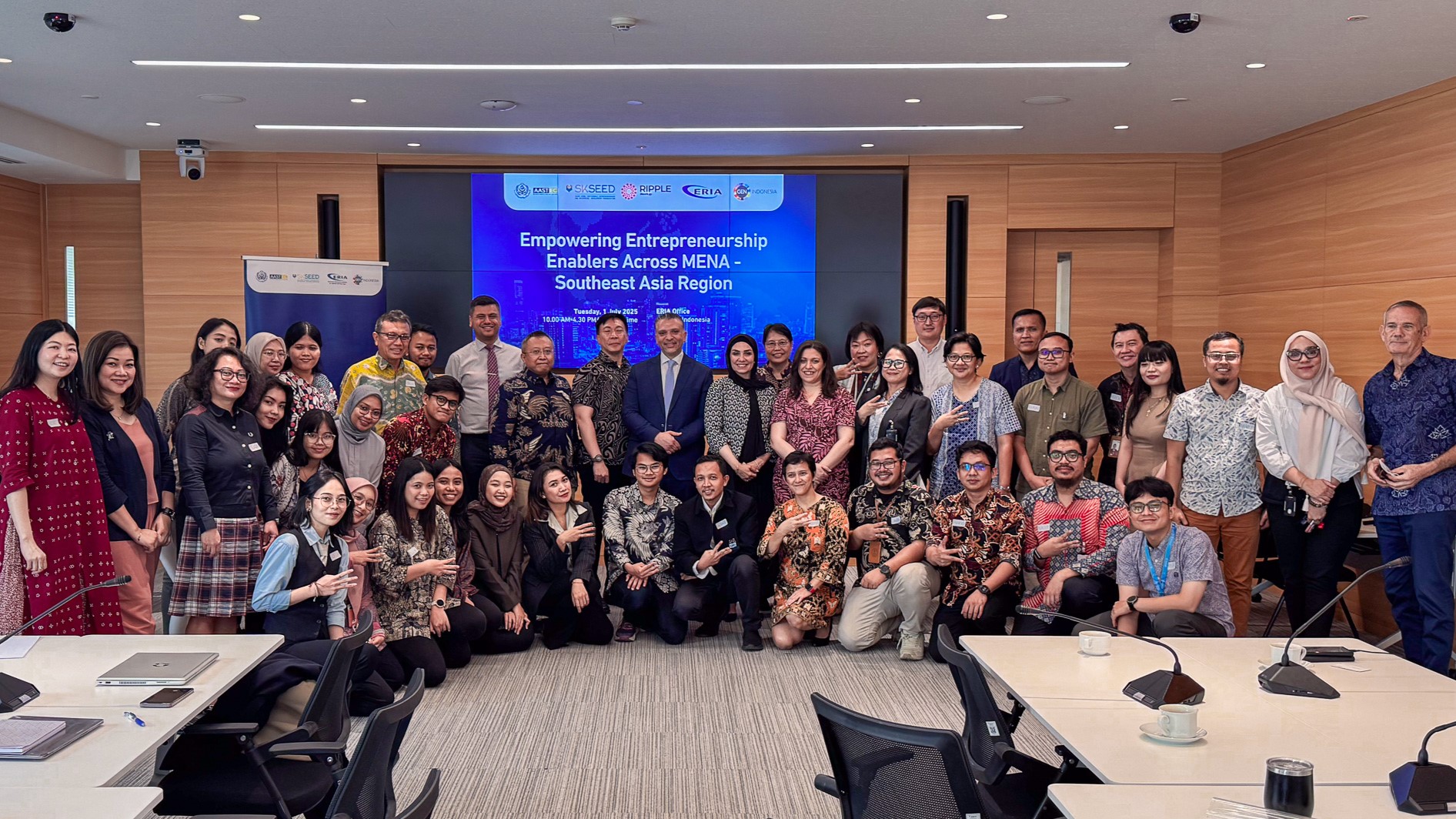ERIA Hosts Virtual Forum on Fostering Regulatory Cooperation Through Implementation of GRP in ASEAN
Share Article:
Print Article:
Jakarta, 20 July 2020: The Economic Research Institute for ASEAN and East Asia (ERIA) hosted a Virtual Forum on Fostering Regulatory Cooperation through Implementation of Good Regulatory Practices (GRP) Principles in ASEAN, to share experiences and best practices around the region on Wednesday,15th July 2020. This Forum was a follow-up to the outcome of the ASEAN Regulatory Management System (RMS) Baseline Study, a joint initiative of the ERIA and the ASEAN Secretariat for the ASEAN High-Level Task Force on Economic Integration (HLTF-EI). The study is an important deliverable under the strategic priority area, ‘Strengthen Strategic Efforts to Implement GRP’ in the ASEAN Work Plan on GRP 2016–2025. The Work Plan was adopted at the 23rd ASEAN Economic Ministers Retreat and endorsed by the ASEAN Economic Community (AEC) Council Ministers in April 2017.
The virtual forum was divided into three sessions, led by Dr Julia Tijaja (Director, ASEAN Integration Monitoring Directorate, the ASEAN Secretariat) and Dr Intan Murnira Ramli (Policy Fellow, ERIA) with Dr Rashesh Shrestha (Economist, ERIA), Mr Salvador Buban (Policy Fellow, ERIA), and Mr Jeremy Gross (Director of Capacity Building, ERIA) acting as moderators.
At the opening session, Dr Tijaja welcomed all the participants to the forum whilst underlining the importance of the GRP agenda for ASEAN. She also highlighted the forum as a chance to revisit the important key lessons from the RMS Baseline Study, to further improve the regulatory practice in each ASEAN Member States (AMS), and to widen regulatory cooperation. Following the opening remark, Dr Ramli delivered the contextual framing of the RMS Baseline Study.
The first session discussed ‘The Development of RMS in AMS and Best Practices,’ with Dato’ Abdul Latif Hj. Abu Seman (Director General, Malaysia Productivity Corporation), Ms Kay Sugino (Deputy Director, Singapore Ministry of Trade and Industry), and Dr Alexander Chandra (Assistant Director and Head of Analysis and Monitoring on Trade, Investment, and Emerging Issues, ASEAN Integration Monitoring Directorate, the ASEAN Secretariat) as the panelists. They focused on the current structure, enterprise-based mindset, and success stories of PEMUDAH in Malaysia and Pro-Enterprise Panel (PEP) in Singapore, while also discussed the progress of the ASEAN Secretariat to implement GRP Core Principle through the ASEAN Solutions for Investments, Services, and Trade (ASSIST).
The second session examined ‘The Showcase of the Use of Regulatory Tool in an RMS Framework’ with Atty Ernesto V. Perez (Deputy Director-General of the Anti-Red Tape Authority, Office of President, Philippines), and Dr Vo Tri Thanh (Senior Expert, Central Institute for Economic Management; and a Chairman of Vietnamese Committee for Pacific Economic Cooperation Council) as the panelists. They presented the Philippine's regulatory initiatives by the Anti-Red Tape Authority (ARTA) to address immediate issues and over-regulation, as well as Viet Nam’s success in raising investor confidence on the ‘regulatory guillotine’[i] under Project 30 in raising investor confidence.
The third session explored ‘Experiences and Perspectives from OECD and New Zealand’ with Dr Derek Gill (Principal Economist in New Zealand Institute of Economic Research and a Visiting Fellow in New Zealand Institute of Policy Studies) addressing New Zealand’s regulatory stewardship programme and Dr Mike Pfister (Senior Advisor, OECD Investment Division) presenting the ASEAN–OECD GRP Network (GRPN) updates on international regulatory cooperation and behavioral insights analysis.
Many developments, practices, initiatives, and ongoing programmes related to the RMS were presented with input from AMS including Malaysia and Singapore on how they simplified their regulations or licenses, built capacity, and digitalized their public services. However, Dr Gill did remind the AMS to be aware of the ‘long history of set and forget’ which refers to the fact that once laws are drafted, people tend to forget about them. Further, he emphasized the importance of ongoing regulation maintenance ‘like a long-lasting asset, as we paint our houses and service our cars.’
At the concluding session, Dr Ramli shared ERIA’s key findings and recommendations in the ASEAN RMS Baseline Study. She underlined the different levels of the GRP enforcement in each of the AMS and provided five key recommendations including capacity building, quality control by oversight coordination and clear policy, the institutionalization of the GRP, extensive public and private sector engagement, and the regional programme to strengthen the continuous GRP journey in ensuring that the GRP Principles are embedded into the whole government bureaucracy and accepted by the related Government officials in their work processes.
Dr Chandra closed the forum by reaffirming the importance of implementing the GRP Core Principles for each of the ASEAN sectoral bodies and encouraged further discussion on the next critical steps to execute the recommendations.
The Forum was successful in highlighting the implementation of GRP, best practices, and also the findings and recommendations from the Baseline Study in ASEAN. It is evident that more and more AMS are improving their regulatory processes, systems, and institutions which led to the improvement of their regulatory regime and business and investment climates. The quality of the regulatory regime and institutions in a country is an integral aspect to attract investment and foster development in ASEAN. However, the drive toward a well-performing RMS takes time and its evolution is shaped by the characteristics of each AMS. Once endorsed by AMS, the findings of the report are intended to guide ASEAN in its delivery of other key outputs envisaged in the ASEAN GRP Work Plan 2016.
[i] An approach developed by Jacobs and Associates which refers to an orderly, systematic, transparent, rapid, and low-cost means of counting and then rapidly reviewing a large number of regulations against clear scientific criteria for good regulation, and eliminating those that are no longer needed.
ERIA Publication Links on RMS, GRP, and IRC
Regulatory Management System
- Ponciano Intal and Derek Gill, The Development of Regulatory Management Systems in East Asia: Deconstruction, Insights, and Fostering ASEAN's Quiet Revolution, 2016, RPR FY2015 No.3, Accessed 21 July 2020.
- Derek Gill and Ponciano Intal, The Development of Regulatory Management Systems in East Asia Country Studies, 2016, RPR FY2015 04, Accessed 21 July 2020.
- Peter Caroll, Derek Gill, and Ponciano Intal, ASEAN’s Regulatory Reform Imperative and Future Prospects, 2016, ASEAN 50 Vol 5, Accessed 21 July 2020.
Good Regulatory Practice
- Sta Maria, R., V. Thanh, A. Seman, and M. Majid (2019), ‘ASEAN of Good Governance: Good Regulatory Practice (GRP), Regulatory Management System (RMS), and Regional Regulatory Cooperation’ AV 2040 VOL 4, Chapter 11, pp. 234–240.
International Regulatory Cooperation
- Derek Gill, Interconnected Government: International Regulatory Cooperation in ASEAN, July 2020, Interconnected Government IRC in ASEAN, Accessed 21 July 2020.
- Derek Gill, Asia and Europe Regulatory Connectivity and Coherence, Asia and Europe Regulatory Connectivity and Coherence, Accessed 21 July 2020.







